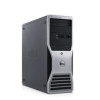Dell Precision 490 Desktop User's Guide - Page 162
Printer Problems, Serial or Parallel Device Problems, Sound and Speaker Problems
 |
View all Dell Precision 490 Desktop manuals
Add to My Manuals
Save this manual to your list of manuals |
Page 162 highlights
Eliminate interference - Some possible causes of interference are: l Power, keyboard, and mouse extension cables l Too many devices on a power strip l Multiple power strips connected to the same electrical outlet Printer Problems Fill out the Diagnostics Checklist as you complete these checks. CAUTION: Before you begin any of the procedures in this section, follow the safety instructions in the Product Information Guide. NOTE: If you need technical assistance for your printer, contact the printer's manufacturer. Check the printer documentation - See the printer documentation for setup and troubleshooting information. Ensure that the printer is turned on Check the printer cable connections - l See the printer documentation for cable connection information. l Ensure that the printer cables are securely connected to the printer and the computer. Test the electrical outlet - Ensure that the electrical outlet is working by testing it with another device, such as a lamp. Verify that the printer is recognized by Windows - 1. Click the Start button, click Control Panel, and then click Printers and Other Hardware. 2. Click View installed printers or fax printers. If the printer is listed, right-click the printer icon. 3. Click Properties and click the Ports tab. For a parallel printer, ensure that the Print to the following port(s): setting is LPT1 (Printer Port). For a USB printer, ensure that the Print to the following port(s): setting is USB. Reinstall the printer driver - See the printer documentation for instructions Serial or Parallel Device Problems Fill out the Diagnostics Checklist as you complete these checks. CAUTION: Before you begin any of the procedures in this section, follow the safety instructions in the Product Information Guide. NOTE: If you are having a problem with a printer, see Printer Problems. Check the option setting - See the device's documentation for the recommended settings. Then enter system setup and go to the Integrated Devices option settings (see System Setup). Ensure that the Serial Port setting or the Parallel Port setting matches the recommended settings. Run the Dell Diagnostics - See Dell Diagnostics. Sound and Speaker Problems















